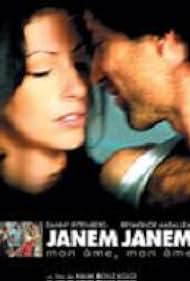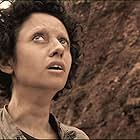It is a small miracle than in a country where secularists define themselves as being non-observant, implicitly acknowledging the pervasiveness of religion, Haim Bouzaglo manages to create secular films. In Janem, Janem, the second of his projected trilogy, he has created a fascinating portrait of people caught in contemporary events who are Israeli only as a matter of geographic identification, their Jewishness neither discernible nor relevant. In doing so, he has freed his characters from their historical burden and enabled him to concentrate on their essential and international humanity.
As in the brilliant and brooding Distortion, this film also follows a disconnected and discontented individual. In Distortion, he is a blocked playwright; in Janem, Janem, he is the unhappy schoolteacher, Eldi. An ex-soldier, he drops out of family and society in reaction to his middle class life as much as to his tour of duty. Like Wakefield in the Hawthorne story, he "steps aside," and like Wakefield who lives the next 40 years one street over from where he can observe his family, the schoolteacher merely disappears inside Tel Aviv. He lives and works with illegal Romanian and Turkish workers and gets involved with Russian prostitutes and criminal elements in his native city. Bouzaglo makes him Everyman by making him a no man:alienated, homeless, one of the shadow people. The metaphor is cleara "real" Israeli, family man, citizen, member of a helping profession, can feel and be as separated from contemporary Israeli life as the other non-entitiesthe prostitutes, criminals, and illegal guest workers.
What is remarkable is how much tenderness and humor Bouzaglo manages to infuse into the "down and out" life. The posturing illegals, auditioning to be painted and seduced by the artist, the poignant moments as the men call home, the love stories among the prostitutes, dropouts, and criminals, even the search for the man on the run, are characterized by visually arresting moments and sweet connections. Against the background of the year moving toward Christmas (in an Israeli film!), the world Bouzaglo has created draws us in, making us hope that Eldi's alternate life will not be ended by discovery and that lovers will be reunited. But homicide bombers stalk the city and anyone could be the killer just as everyone could become the victim.
At the end, Eldi's mid-life crisis is the mid-life crisis of Israel. But where in Bouzaglo's earlier Fictitious Marriage similar plot elements created an Arab-Israeli story specific to time and place, in Janem, Janem they create an Israel made universal. When the tattered national flag finds its way into the final scene, we are startled, reminded that it really is Israel, that mythical, ancient land, that is the subject of this film.








